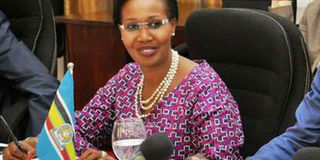The murder of Hafsa Mossi a big blow to peace efforts in Burundi

This photo dated March 14, 2011 shows Burundi's Minister for East African Community Affairs, Hafsa Mossi, at the official opening of the fourth EAC conference at Hilton Nairobi Hotel. PHOTO | FREDRICK ONYANGO | NATION MEDIA GROUP
What you need to know:
- Many people in Burundi continue to suffer the effects of this unspeakable violence.
- Those of us lucky enough to enjoy peace have a fleeting interest in the horror that has become the everyday way of life for people in Burundi. The loud message out of the killing of Mossi is that no one is immune to these targeted assassinations in Burundi.
The East African Legislative Assembly (Eala) held a special sitting in honour of Ms Hafsa Mossi on Thursday. Mossi was brutally murdered as she drove into her home in Bujumbura on Wednesday, July 13, 2016.
The motion calls the Assembly to "resolve to condemn the killing of, and to pay tribute to Ms Mossi”.
During the special sitting, Eala demanded thorough investigations. Members demanded the suspension of Eala sittings in Burundi.
They noted heightened insecurity in Burundi and argued that it was no longer tolerable for anyone to hide behind sovereignty when citizens were being killed in many cases through targeted assassinations. As Mr Abdallah Mwinyi noted on the floor, the murder of Mossi brings the Burundi crisis into the Eala.
Mossi was a former journalist who rose to serve in Pierre Nkuruzinza’s government. She was a former minister responsible for East African Community affairs. As Dora Byamukama noted, Mossi was assassinated because she stood for peace.
I am one of those lucky to have interacted with Mossi in January 2016. I was invited as rapporteur to the Regional Affairs and Conflict Resolution Committee chaired by Mwinyi. The committee held public hearings in response to a petition of the citizens of the EAC on the deteriorating human rights and humanitarian situation in Burundi submitted by Pan African Lawyers Union.
The petition noted the rising political, human rights and humanitarian crisis in Burundi that had led to many cases of assassinations, extrajudicial and arbitrary killings and demanded action.
GOVERNMENT'S CAPACITY
But the petition was also sceptical about the capacity of the Burundi government to firmly deal with the situation in which it was implicated.
It urged the assembly to boldly resolve that urgent action be taken and, where this was not possible, call upon the chairperson of "the AU to take concrete steps towards preventing Burundi from descending into genocide or mass atrocities".
Most of the prayers were granted as all members of the committee, except three, signed the report that was subsequently adopted by the assembly. Yet, Mossi is dead. During the hearings, one noted the tensions in the room for members from Burundi that spoke directly to the personal dilemmas they confronted. Their desire for peace in Burundi was clear but few could speak out for many reasons. Indeed, around the time of the petition and discussion of the report, some members from Burundi had their immediate and extended families targeted.
It is not clear who assassinated Mossi. But as Mr Abubakar Zein demonstrated on the floor, threats to her had come from both sides of the political crisis. It did not help matters that she is born to Hutu and Tutsi parents. She represented the dilemma that one confronts about Burundi’s long history of violence and conflict. One recalls in June 2015 when the same committee under the leadership of Zein visited Burundi refugee camps in Rwanda, Mossi was moved to tears at the horror of the refugee situation. Confronted by a picture of a newborn baby whose mother had died, Mossi wept.
The picture of her weeping "went viral". She soon received demands from some in government to explain why she was weeping for "those people". On the other hand, some opposed to the current Burundi government described hers’ as crocodile tears and even started a hashtag to that effect.
Many people in Burundi continue to suffer the effects of this unspeakable violence.
Those of us lucky enough to enjoy peace have a fleeting interest in the horror that has become the everyday way of life for people in Burundi. The loud message out of the killing of Mossi is that no one is immune to these targeted assassinations in Burundi.
Godwin R. Murunga is a senior research fellow at the Institute for Development Studies at the University of Nairobi.





